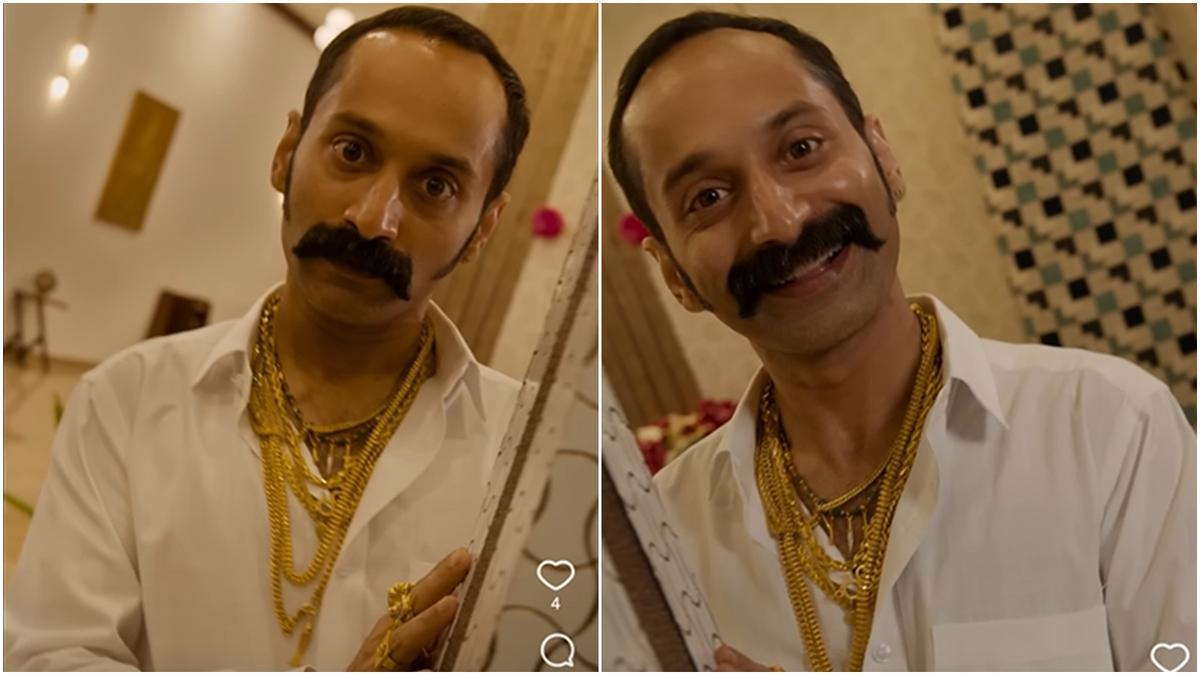
In an unexpected twist of cinematic impact, an under-appreciated track has surged back into the limelight. Spurred by the popular film ‘Aavesham’, starring Fahadh Faasil, the song ‘Karinkaliyalle’ experienced a resurgence in viral popularity, a phenomenon sparked by the protagonist Ranga’s humorous lament over the lack of likes on his Instagram reel featuring the song – a mere four to be precise.
Dressed in the larger-than-life persona of gangster Ranga, Fahadh Faasil’s character in the film captivated audiences, but it was his social media angst that set off a tidal wave of engagement. The scene, where Ranga flits between joy and rage while peering from behind a pillar, has captured public imagination, leading to an outpouring of creativity as fans, celebrities, and public figures alike embrace the viral trend by creating homage reels.
The grassroots beginnings of the celebrated song can be traced back to Thrissur, where a group of local musicians crafted ‘Karinkaliyalle’ as part of an album dedicated to the deity of Kodungallur Devi Temple. The collaborative effort of composer Shaiju Avaran, lyricist Kannan Mangalath, and vocalists Anoop Puthiyedath and Vineesh Kallettumkara, yielded a piece of music that now transcends its regional roots, earning a spot on the silver screen for the first time in the creators’ careers.
Shaiju, a painter by profession, recounts the song’s silent gestation period, revealed as the film production reached out to him and his team for an agreement. This moment was the culmination of creative sessions that bloomed into a viral sensation during the pandemic lockdown. Shaiju reveals the inception of ‘Karinkaliyalle’ when its pallavi, penned by Kannan four years ago, found voice as they gathered as friends, later flourishing into a full song embraced by fans during the annual Bharani festival.
Initially, the song enjoyed an enthusiastic reception on social media, particularly on the now-defunct platform TikTok. Shaiju credits the unknown origin of the initial reel that kickstarted the trend, yet he especially remembers the one posted by Kochi Metro’s social media which caught significant attention.
Lyricist Kannan worked with a cable provider but harbored aspirations that resonated deeply through his lyrics. He crafted ‘Karinkaliyalle’ to channel the indomitable spirit of Goddess Kali, envisioning a symbol of female strength and resistance against oppression. For Kannan, the song is a medium of joy and its adoption in the world of reels satisfies his ambition for the art to bring happiness.
Anoop, an autorickshaw driver, excitedly awaits the formation of his folk band, encouraged by the newfound recognition of ‘Karinkaliyalle’. And it’s not just the creators of the song who are reveling in its success. The tune has become a backdrop for a colorful array of social media reels by cricket players from the Indian Premier League. Stars like Matheesa Pathirana, Mustafizur Rahman, Pat Cummins, Sunil Narine, Yuzvendra Chahal, and R Ashwin among others, have all lent their personas to the infectious rhythm of ‘Karinkaliyalle’.
But the craze didn’t stop there. It spread to the football field as well with players from Mumbai City FC, winners of the Indian Super League title, creating reels with the triumphant trophy. The entertainment industry also jumped on the bandwagon, featuring renowned Malayalam actors and singers like Shwetha Menon, Abu Salim, Riyaz Khan, Grace Antony, and Rimi Tomy, each adding their unique flair to the trend.
The phenomenon crossed linguistic borders, with multiple content creators adding their version to the mix. Even Mumbai Police utilized the catchy tune to disseminate public warnings in a more engaging manner. With its resurgence through ‘Aavesham’, ‘Karinkaliyalle’ reached remarkable new peaks, achieving up to 22 lakh additional views post the film’s release, adding to its already impressive count of four crore on YouTube.
What started as an off-the-cuff creation from a group of friends has, with the help of a big-screen acknowledgment, fostered a cultural wave that shows no signs of ebbing. ‘Karinkaliyalle’ has become more than just a song—it is a symbol of joy, empowerment, and the unstoppable nature of viral phenomena.












